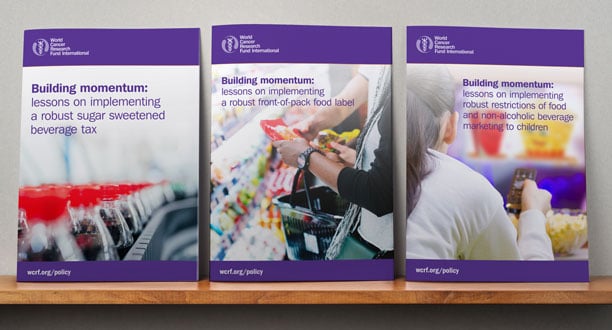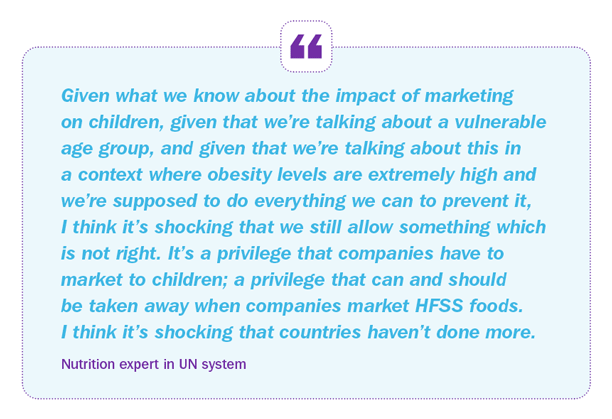 Today, World Cancer Research Fund’s Policy and Public Affairs team launched its third Building Momentum report, which focuses on marketing restrictions of unhealthy food and beverages to children. It follows the first two reports in the series on the lessons learned on implementing robust sugar sweetened beverage (SSB) taxes, and designing effective front-of-pack nutrition labels (FOPLs).
Today, World Cancer Research Fund’s Policy and Public Affairs team launched its third Building Momentum report, which focuses on marketing restrictions of unhealthy food and beverages to children. It follows the first two reports in the series on the lessons learned on implementing robust sugar sweetened beverage (SSB) taxes, and designing effective front-of-pack nutrition labels (FOPLs).
Fiona Sing, one of the authors of the Building Momentum reports, shares her main takeaways on the latest publication.
All three of our Building Momentum reports have generated consistent learnings about the challenges in designing robust nutrition policies that promote healthy diets. However, one thing stood out to me when researching and writing this report. The overwhelming need to restrict the marketing of unhealthy food and beverages to children is made evident in a wealth of international guidance.
This includes the World Health Organization (WHO) Recommendations on Marketing of Unhealthy Food and Beverages to Children and other WHO guidance (see Table on page 14 of Building Momentum report), international human rights law and scientific evidence. The case for marketing restrictions has even more evidence than for other effective policy options to reduce non-communicable diseases (NCDs), including SSBs and FOPLs. Yet it is an area that experiences significant policy inertia. Very few countries have implemented restrictions, and even fewer do it well.

The political history
Researchers around the world have provided years of robust, credible and independent research to show how marketing practices impact children’s eating behaviour, preferences, requests, nutrition knowledge and food intake. All of this leads them to prefer to consume unhealthy products.
But governments still predominantly choose to implement voluntary marketing restrictions or let the industry self-regulate themselves. Self-regulatory systems are ineffective at reducing the exposure and power of marketing of unhealthy food to children – our table of evidence in the latest report summarises these studies.
We had very few examples of best practice to draw on in this report – every regulatory system currently in place has flaws. The best example we can draw on is from Chile, but even their policy could be strengthened. Typically the age of the children protected is too low, the marketing mediums covered are too narrow, or the definition of ‘targeted at children’ is not fit for purpose.
Why the inertia?
When we interviewed policymakers, civil society members and academics for this new report, we heard all the same arguments that industry throw at governments to try to interrupt the policy process – nanny state regulation, economic impact, breach of their right to trade or use their intellectual property, self-regulation is all that is needed, and the list goes on. Industry did not have anything new in their playbook. Yet these arguments still affect the prevalence and strength of restrictions around the world.

A way forward?
Using a child rights-based approach offers a powerful way of reframing the issue to shift the dial on the policy inertia, as advocated for by marketing restriction experts like Prof Amandine Garde, from the NCD and Law Unit at the University of Liverpool. Governments have a duty to fulfil and protect children’s rights under the UN Convention on the Rights of the Child (all but two countries are signatories) and restricting the food and beverage industry’s ability to target children with unhealthy food products is one way governments can fulfil their legal obligation.
Overcoming opposition
When industry is threatened with marketing restrictions they claim that their right to trade or use their intellectual property will be violated, but their commercial rights are not absolute. In fact, governments have been regulating in the interests of public health for many years – such as tobacco laws, alcohol restrictions, seatbelts and gun control.
Evidence gathered in the report highlights the importance of having a legitimate public health objective, backed by a sound evidence base that shows how the chosen policy will meet that legitimate public health objective when using a rights-based approach. The gap between evidence and action is enormous and unacceptable, and it is well past time for governments to implement stronger regulatory systems.
The latest Building Momentum report brings together the wealth of knowledge and expertise fused with experience from countries around the world to help governments overcome issues with industry interference and lack of political will within governments.
